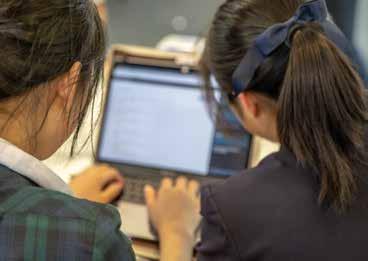BOOK REVIEW Running the right race By Director of Teaching and Learning, Ms Tricia Allen PISA is the Organisation for Economic Co-operation and Development’s (OECD) Programme for International Student Assessment. The test - in reading, mathematics and science - is given every three years to 15-year-old students from all over the world. The tests are designed to gauge students’ mastery of key subjects as they relate to learning needed for adult life. In most countries, 15 is the age at which students decide whether they want to continue their education and at this point they need to be prepared for adult life. Pymble has participated in PISA on numerous occasions, most recently in 2018. THE GLOBAL EDUCATION RACE: TAKING THE MEASURE OF PISA AND INTERNATIONAL TESTING Sellar, S.,Thompson, G. & Rutkowski, D. (2017). The global education race: Taking the measure of PISA and international testing. Edmonton, Canada: Brush Education. ISBN: 978-1-55059-711-0
another in terms of educational performance and that countries now worry about being left behind. The book aims to provide an introduction to PISA, to highlight how it works both in technical and political terms, and to argue for a broader debate in the ability to meaningfully assign numbers to education, the rationality of data (mis)use, and the negative consequences of data. What sets this book apart from other examinations of PISA is the target audience. Written to make the information accessible to all stakeholders, including educators, parents and teachers, it aims to examine how PISA shapes educational thinking and to challenge the myths about the performance comparison of school systems that have emerged as a result of PISA. In short, it aims to help people understand “…what PISA is, what it does, and what it cannot do” (Sellar et al., 2017, p. 7). The book is not anti-testing nor anti-PISA, rather, it looks at the potential usefulness of PISA beyond national scores and rankings. It does not offer any simple solutions to the complex nature of educational reform. The authors stress the usefulness of PISA as a place to start a conversation about what the data can reveal, rather than a report card on the success of educational systems.
The early chapters focus on the myths surrounding media coverage of PISA data, with particular emphasis on rankings. The authors refer to the OECD explanation We have reached a point in education where the “that less than 1% of its PISA report focuses on league measuring and ranking of school performance has tables, a much higher percentage created a global race. In recent decades, of the media reporting does focus on there has been a growth of testing in In recent decades, these tables” (Sellar et al., 2017, p. 18). education and this has become part of a there has been According to an Education International broader trend towards ‘datafication,’ which a growth of testing publication “the impact of PISA through essentially means assigning numbers to in education and this the media is undeniable” (Education objects and events. In Sam Sellar, Greg has become part of a International, 2007, paragraph 12). Thompson, and David Rutkowksi’s book, broader trend towards The problem arises when these results The Global Education Race: Taking ‘datafication,’ which get amplified through the media where the Measure of PISA and International essentially means simplistic stories about crises and decline Testing, the authors make clear that the assigning numbers become detached from the basis of Organisation for Economic Co-operation to objects and events.” evidence itself and then get used to and Development (OECD) Programme for justify particular policies or reform. This Student Assessment (PISA) is “…the main was the case in the 2013 Australian track on which the global education race Education Act, where one of the objects of this Act was is run” (Sellar et al., 2017, p. 6). This global education “race” has become a metaphor which has emerged in newspaper for “Australia to be placed, by 2025, in the top 5 highest performing countries based on the performance of school headlines, political speeches, and think-tank reports. students in reading, mathematics and science” (Australian It suggests that schooling has now become a global Education Act, 2013, p. 3). This is a non-sensical goal competition in which each country strives to surpass
20
|
Illuminate EDITION 2 2019
Pymble Ladies’ College












